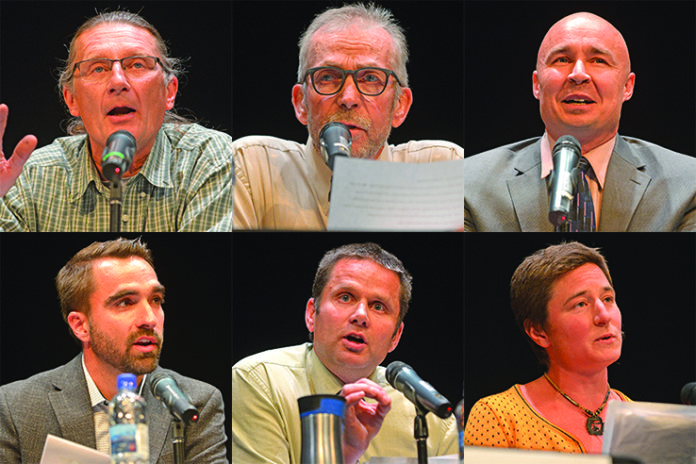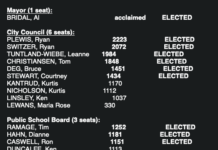
Voters in the Cypress Hills Grasslands Constituency had a chance on October 10 to hear directly from the six hopefuls vying for a chance to represent the Southwest as the constituency’s new Member of Parliament in Ottawa.
An All-Candidates Forum at the Living Sky Casino last Thursday was one of just two opportunities the six candidates had an opportunity to present their platforms and policies in front of a live audience. The only other all candidates event was hosted in Kindersley.
As an information session and not a debate, the candidates had a 10 minute opportunity to put their best foot forward, as well as a question and answer session which allowed them to delve into six topics.
A highlight of their opening remark presentation (in order they were delivered).
JEREMY PATZER
CONSERVATIVE PARTY OF CANADA
Patzer listed a series of Liberal introduced factors which are holding back the Southwest.
“The last four years have seen higher payroll taxes, higher taxes on business investments, taxes on spouses and family members within the business and within the farm, and of course a Carbon Tax.”
“Increases in EI and CPP have prevented businesses from hiring more staff, as the cost of keeping existing employees keeps going up, while revenues they go down. These are some of the factors that have combined to drive business investment in Canada down eight per cent over the past four years.”
“A Conservative government will reduce these payroll taxes, scrap the Carbon Tax, increase the Capital Gains exemption to encourage growth and investment to your business and farm, and also exempt spouses from taxes on small business dividends.”
He said that since he sought out the Conservative nomination earlier this year, a common thread has been shared across the constituency.
“Over the past eight months travelling the riding, people and businesses have made it quite clear, we cannot afford another four years of Liberal government. They are all frustrated by the lack of respect for Western Canada, and the main industries that help drive our economy.”
He feels the Conservatives have a fiscally responsible strategy and will eliminate $1.5 billion in corporate welfare every year.
“We have a plan to balance the budget, with a focus on economic growth and eliminating wasteful handouts and spending. People are looking around at all the money thats been wasted on new fridges for Loblaws, tweeting out multi million dollar pledges to Hollywood celebrities, ten and a half million given to an admitted terrorist, and not to mention the billions of dollars that have gone out to groups internationally that have direct ties to terrorist organizations.”
He said in the Southwest that both agriculture and the energy sector have suffered over the last four years under the Liberals.
“A Conservative government will support these key industries that provide employment and business opportunities to Canadians across the country. We have a plan to unite Canadians with a National Energy Corridor, a project which will bring jobs and certainty to the energy sector. With this project we will be able to responsibly move Canadian oil to our refineries, get our product to tidewater where we will be able to get a fair price and no longer have to accept lower prices compared to the world market.”
“One of the biggest gains that we will have with the energy corridor is to become energy independent by 2030. In 2013 we spent $26 billion importing foreign oil, which represented 43 per cent of all the oil that we used in Canada that year.”
He noted those imports included Saudi Arabia and Venezuela, countries which boast poor human rights records and little environmental responsibility.
He said they will immediately begin work to restore Canada’s trading relationships with China, India and Italy in order to restore market access.
“Our international trade has been hurt and reduced these last four years by individuals who have been careless in their actions and our farmers and small businesses they’re the ones who have been taking the brunt of that.”
TREVOR PETERSON – NEW DEMOCRATIC PARTY
Peterson highlighted the ongoing cycle of Canada being held back by consecutive Conservative and Liberal governments.
“Decades of Liberal and Conservative governments have made life easier for super rich and the massive corporations, and harder for the rest of us.”
The NDP wants to break that cycle.
“We are on the side of working Canadians, not big corporations and lobbyists.”
“The NDP is offering a new deal for people. Expanding medicare to include a national pharmacare program, universal dental and vision care, mental healthcare for all.”
He said the platforms of both the Liberals and Conservatives are more of the same that Canadians are getting tired of.
“The Liberals made big promises in 2011, and Canadians haven’t got the real changes they were told were coming.”
“The Conservatives on the other hand are offering up the same old, tired, Stephen Harper playbook. And Canadians aren’t interested in mean cuts and mean spirited politics.”
He highlighted that the Conservatives are promising to cut foreign aid by 25 per cent, but he argues that Canada currently gives less than three per cent of gross national income to foreign aid.
“As someone who has volunteered in Rwanda with my wife and my children, I can tell you that that foreign aid is very important. And when we make those cuts, how many kids are not going to get educated and vaccinated.”
Peterson argued that the Conservatives previously balanced the budget through steps such as taking$1.8 billion from the EI fund surplus in 2015.
He commented that Canadian wages are stagnant but the well connected have gotten ahead under Liberals and Conservatives, as the richest one per cent have captured 33 per cent of the income gains in Canada’s economic growth.
At the same time, he said there has been a combined cut of nearly 50 per cent to taxes on large corporations during 10 cuts since 2000. This has resulted in $700 billion in lost revenue for the country. Additionally, well to do Canadians have hidden up to $240 billion in foreign accounts, dodging up to $3 billion in year in federal taxes. Both these sources of revenue would help the NDP invest in Canadians.
“Because of these corporate tax cuts, the Liberals and Conservatives have tried to balance the budget on the backs of low and middle income Canadians. They’re looking out for big corporations.”
“We are on the side of working Canadians, not big corporations and lobbyists.”
“The NDP is offering a new deal for people. Expanding medicare to include a national pharmacare program, universal dental and vision care, mental healthcare for all.”
Peterson said the NDP will build 500,000 new homes to erase the housing crunch, reduce childcare costs with an initial investment of $1 billion while working towards a national Child Care Program.
They also intend to drop interest rates on Canada Student Loans while working towards non repayable grants. In the future Post Secondary education would be part of the public education system, allowing children to go from Kindergarten to a career with no barrier of cost.
This additional spending could easily be covered though higher taxed paid by well off Canadians.
“We’ll ask the billionaires and the large multi national corporations to pay their fair share. We’ll crack down on overseas tax havens,” he said. “We’ll work to close tax loopholes, and we’ll charge just one per cent on wealth over $20 million.”
He contended the parliamentary budget officer has said this wealth tax will add $700 billion in revenue in a decade.
He also took aim at the need for a real climate change initiative. He said that during a transition to a green economy, they will look out for average Canadians.
“We need a climate strategy that will invest and support workers, families, students, small businesses in making the transition to a green economy. A strategy that will benefit all parts of the country, and all sectors of the economy, including agriculture and energy.”
MARIA ROSE LEWANS
INDEPENDENT
Lewans spelled out her vision for a utopian society and need to return to an agrarian way of life.
“We are on land that was never meant to be owned, and was never meant to be broken. Because it is broken. Politics is also broken. I think that’s something that we can all agree on. And to fix a broken system you can not rely on the same broken logic that was used to create
it. So this election I am challenging you to keep an open mind, listen without judgement, and imagine the possibilities of what life could be like if we allow ourselves to think outside the box and demand better.”
The independent candidate said she is living more sustainably on her city lot and is slowly transforming her yard into “sustainable agriculture” which boasts seven plum trees, three apple trees, a variety of fruit bearing bushes, along with other vegetables and herbal and medicinal plants.
“When fully grown my property will provide food and medicine, not only for myself but many others.”
She said the fibre from plant stocks and leaves can be used for paper production, weaved baskets, and willow branches can be turned into salicylic acid which belongs to the same class of drugs as aspirin.
She advocated a series of solutions by living a minimalist lifestyle and a throwback to early 20th century practices.
“You see kochia as a weed, I see toilet paper.”
She advocated that people return to the land instead of working in factories and sitting in front of computers.
“Maybe our jobs can be restoring nature, so the wildlife populations can rebuild, rebound and bring in opportunities to hunt for food as an occupation.”
“What if we start working with nature instead of against it because lets face it we will never win against nature.”
She went so far as to advocate eliminating all technology.
“Junk food should be relegated to history. As well as televisions, computers and cellphones. Lets start ripping up lawns and planting food. Lets allow land for small sustainable communities to exist.”
BILL CLARY
GREEN PARTY OF CANADA
With each party boasting a substantial ‘gift list’ to encourage voters to give them a mandate in Ottawa, Clary provided context for the comprehensive policies and platform offered by the Green Party.
“Climate Change is real, and its impacts are already being felt right here in Southwest Saskatchewan. And the Green Party is ready to take bold action to meet this most pressing issue and to begin to mitigate some of the worst impacts of climate change and live in a sustainable way in this new reality.”
He said a serious climate change platform only makes sense in the context of agreeing that there is a catastrophic environmental disaster occurring. He said other parties are ignoring the work of the United Nations Intergovernmental Panel on Climate Change.
“The report tells us, in no uncertain terms, that the continued use of fossil fuel is destroying the very environment we depend upon for our life.”
The IPCC, formed in 1988 and representing 195 member countries, is dedicated to providing a scientific view of Climate Change and possible response options. Their conclusive climate change report, which cites more than 6,000 scientific references, and includes dedicated contribution of thousands of experts and government reviewers world wide.
“The report finds that limiting global warming to 1.5 degrees would require rapid and far reaching transitions in land, energy, industry, building and cities. Global net human caused emissions of carbon dioxide would need to fall by 45 per cent from 2010 levels by 2030, reaching net zero by 2050,” Clary highlighted.
“Limiting warming to 1.5 degrees is possible within the laws of chemistry and physics. But doing so would require unprecedented change.”
He noted that while the other parties do not come close in their climate change plans to meet the required charges, the Green Party acknowledges and accepts the science.
He said the Green Party’s Mission Possible platform would align Canada with the science of Climate Change while achieving full employment and a robust social program while meeting reduction targets.
He said it was unfortunate that there has been an organized industry effort, dating back to 1988, to deliberate sew doubt on the veracity of climate science.
LEE HARDING
PEOPLE’S PARTY OF CANADA
Harding challenged voters to truly look at the platforms of each party.
“I hope that you will have the openness to look at our platform and consider what it is that we bring to the table.”
He highlighted the PPC as the only party taking a stand on equalization.
“No one is winning under this ‘poverty trap’. The Conservatives have invented the system. When they brought it in in the mid 2000s they bragged that it was the most generous in Canadian history. And they also brought in the mechanism that would make sure that it increased every year.”
“We have a system in Canada whereby so called have provinces give money to the have nots. Well the criteria for this is very Quebec-friendly, not coincidently, and so they get two-thirds of the money. Four other provinces receive the remainder. And Alberta, Saskatchewan, BC, Newfoundland and now Ontario get nothing.”
He said this system is unfair to provinces doing the right things by developing their resources and keeping taxes low. He argued recipient provinces are keeping their taxes high and leaving resources in the ground so they do not jeopardize their equalization payments.
“The People’s Party stands uniquely alone in calling for radical changes there.”
Harding said the People’s Party of Canada wants to get rid of Carbon Tax. He noted they also want to
eliminate the Capital Gains Tax because they feel it is a productivity killer, but the Conservatives want to increase the Capital Gains Tax.
Harding said the federal government also has to be smarter with taxpayers dollars.
“We want to stop the practice of taxpayer dollars going to corporations,” Harding explained. “We believe that it is not moral for a government to give money to private companies, to pick winners and losers. Because in the end we all become losers from it. We should keep a free market. We should keep adequate but not overbearing regulation, taxes as the right level, and let the businesses sort themselves out.”
He said the party also wants to reduce foreign aid for natural disasters and emergencies.
They also have a plan to tackle the current deficit situation by taking a practical approach to balancing the budget in two years.
He also waded into the issue of immigration.
“As far as immigration goes, we want to have reduced numbers,” Harding said, noting that 49 per cent of Canadians in a recent public opinion poll agreed with this sentiment, while 31 per cent wanted it kept the same.
“What we want to do is to, first of all make sure that our border is secured. There are people who, if they do not go to a actual legal border crossing, would be turned back because they could get refugee status in the United States. But because they come over an unguarded crossing we process them. It will usually cost $14,000 a claim. Many of the people their claims have not been processed yet. Of those that have, 40 per cent have been shown to not be refugees. And in the meantime the provinces are paying for their healthcare, their welfare and their education. We believe it’s important to have an approach to immigration that prioritizes first of all Canada’s job needs, and that we don’t have a system that is burdened so that we can not take care of our seniors in future years.”
Harding said this is a perfect time for a movement like the People’s Party of Canada.
“There is an opportunity in front of us because Trudeau has turned eight of the provinces into right leaning governments. Jason Kenney is bringing equalization to the table because he want to see some constitutional changes. And we could remake Canada in a better image than it has ever had.”
WILLIAM CATON
LIBERAL PARTY OF CANADA
Caton noted that the agriculture sector has some significant problems to deal with in the next few months.
“Trade Wars and adverse weather conditions have combined to put many producers in a negative margin position. Market access issues are a huge problem. Countries are throwing up trade barriers. China for canola, beef and pork. Italy for durum. And India for pulse crops.”
“A new Liberal government will work at solving these problems with trade agreements like new NAFTA, CETA, and TPP, broadening existing markets and working to establish new markets for agricultural goods.”
He explained that beef and pork is also negatively impacted by closed borders, and they are currently being sold seriously below break even levels.
“A new Liberal government will also work with producers and farm organizations to develop safety net programs that actually work for producers.”
In the area of climate change, Caton point blank said Global Warming is real, man-made, and needs to be dealt with. He also felt that a price on emissions will help reduce them.
However he also took a strong stance in support of pipeline development.
“A Liberal government will continue to support the Southwest oil industry. A Liberal government will get the pipelines build. The Trans Mountain pipeline expansion will begin in the next constriction season. Having access to world markets is critical. Without it our oil is limited to only North American customers and suffers a price discount of about $20 a barrel.”
He said the Liberals have conducted environmental reviews and have attached regulatory reviews to provide safeguards for the safety of the pipeline projects.
Pipelines will deliver the strong economy necessary to help make the transition to renewable energy, wind, solar and thermal.
Caton said the Liberals have not received credit for their positive initiatives over the past four years, including maintaining a strong credit rating, and helping Canada’s federal debt to GDP becoming the best in the G7.
They have also introduced and increased Canada Child Benefit, cut taxes for the middle class, built more affordable housing with the first national housing strategy, overseeing an economy that added one million new jobs since 2015, and delivering Canada’s lowest unemployment rate in 40 years.
“The choice in this election is to go backwards to the failed policies of Stephen Harper, or continue to go forward with Justin Trudeau and the Liberal team. Choose forward.”





